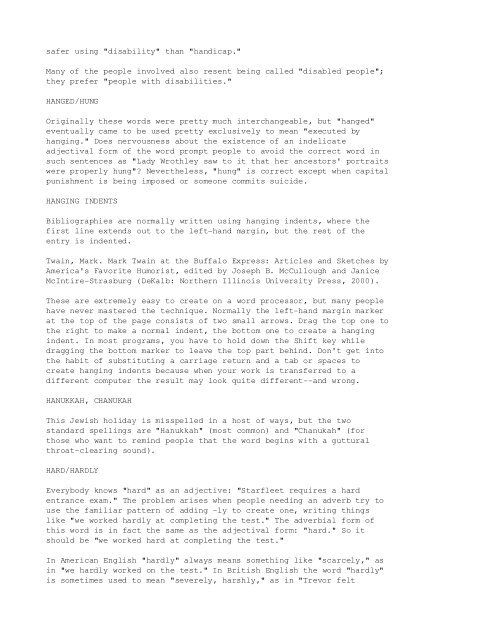Common_Errors_in_English_usage
Common_Errors_in_English_usage
Common_Errors_in_English_usage
You also want an ePaper? Increase the reach of your titles
YUMPU automatically turns print PDFs into web optimized ePapers that Google loves.
safer us<strong>in</strong>g "disability" than "handicap."<br />
Many of the people <strong>in</strong>volved also resent be<strong>in</strong>g called "disabled people";<br />
they prefer "people with disabilities."<br />
HANGED/HUNG<br />
Orig<strong>in</strong>ally these words were pretty much <strong>in</strong>terchangeable, but "hanged"<br />
eventually came to be used pretty exclusively to mean "executed by<br />
hang<strong>in</strong>g." Does nervousness about the existence of an <strong>in</strong>delicate<br />
adjectival form of the word prompt people to avoid the correct word <strong>in</strong><br />
such sentences as "Lady Wrothley saw to it that her ancestors' portraits<br />
were properly hung"? Nevertheless, "hung" is correct except when capital<br />
punishment is be<strong>in</strong>g imposed or someone commits suicide.<br />
HANGING INDENTS<br />
Bibliographies are normally written us<strong>in</strong>g hang<strong>in</strong>g <strong>in</strong>dents, where the<br />
first l<strong>in</strong>e extends out to the lefthand marg<strong>in</strong>, but the rest of the<br />
entry is <strong>in</strong>dented.<br />
Twa<strong>in</strong>, Mark. Mark Twa<strong>in</strong> at the Buffalo Express: Articles and Sketches by<br />
America's Favorite Humorist, edited by Joseph B. McCullough and Janice<br />
McIntireStrasburg (DeKalb: Northern Ill<strong>in</strong>ois University Press, 2000).<br />
These are extremely easy to create on a word processor, but many people<br />
have never mastered the technique. Normally the lefthand marg<strong>in</strong> marker<br />
at the top of the page consists of two small arrows. Drag the top one to<br />
the right to make a normal <strong>in</strong>dent, the bottom one to create a hang<strong>in</strong>g<br />
<strong>in</strong>dent. In most programs, you have to hold down the Shift key while<br />
dragg<strong>in</strong>g the bottom marker to leave the top part beh<strong>in</strong>d. Don't get <strong>in</strong>to<br />
the habit of substitut<strong>in</strong>g a carriage return and a tab or spaces to<br />
create hang<strong>in</strong>g <strong>in</strong>dents because when your work is transferred to a<br />
different computer the result may look quite differentand wrong.<br />
HANUKKAH, CHANUKAH<br />
This Jewish holiday is misspelled <strong>in</strong> a host of ways, but the two<br />
standard spell<strong>in</strong>gs are "Hanukkah" (most common) and "Chanukah" (for<br />
those who want to rem<strong>in</strong>d people that the word beg<strong>in</strong>s with a guttural<br />
throatclear<strong>in</strong>g sound).<br />
HARD/HARDLY<br />
Everybody knows "hard" as an adjective: "Starfleet requires a hard<br />
entrance exam." The problem arises when people need<strong>in</strong>g an adverb try to<br />
use the familiar pattern of add<strong>in</strong>g ly to create one, writ<strong>in</strong>g th<strong>in</strong>gs<br />
like "we worked hardly at complet<strong>in</strong>g the test." The adverbial form of<br />
this word is <strong>in</strong> fact the same as the adjectival form: "hard." So it<br />
should be "we worked hard at complet<strong>in</strong>g the test."<br />
In American <strong>English</strong> "hardly" always means someth<strong>in</strong>g like "scarcely," as<br />
<strong>in</strong> "we hardly worked on the test." In British <strong>English</strong> the word "hardly"<br />
is sometimes used to mean "severely, harshly," as <strong>in</strong> "Trevor felt





